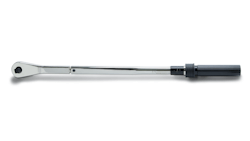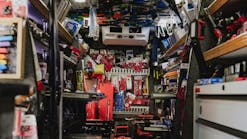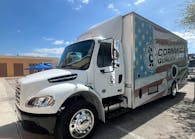Salesmanship isn’t always about having all the right answers. Sometimes it’s about having all the right questions.
Asking your customers the good questions can help them rule out the wrong options and isolate the best options and think through their needs. A little product knowledge and a few simple inquiries can help them make the right choice -- and you’ll likely get all the credit for it!
Take torques wrenches. To the uninitiated, a torque wrench is a torque wrench. But there are various sizes and technologies for your customer to consider depending on the application. Your goal is to ask smart questions and help your customer narrow his choices.
Here’s a brief torque wrench primer that should stimulate questions.
Q: What’s torque? Why does it matter?
A: Torque is turning force. It’s basically how much muscle you’re putting on a fastener when you tighten it (usually a nut or bolt). In a shop, torque is commonly measured in ft/lbs. If you had a ratchet wrench with a foot-long handle and hung a pound of Jelly Belly candies on the end of the handle, you’d be exerting 1 ft/lbs of torque. That’s in a perfect world. (In my world, someone would have eaten half the candy.)
“Torque makes sure that things stay attached,” says Bruce Dawson, VP of sales and marketing at Central Tools and a 20-plus year torque wrench expert.
Q: Why is a torque wrench important?
A: A torque wrench sets the maximum force you can exert on a fastener. It assures that nuts and bolts are on tight enough, but not too tight to cause an issue. It helps maintain a delicate balance. For example, take a wheel: if you overtighten the lug nuts you risk warping the rotors. On the other hand, if you under-tighten the lug nuts you risk losing a wheel.
The original torque wrench is nearly a century old. It was invented in 1918 and patented in 1937 by Conrad Bahr. It was created to prevent workers from overtightening bolts on New York City’s water mains and steam pipes.
Q: What’s new in torque wrenches?
A: “Torque wrenches of the 1950s and torque wrenches today still accomplish a lot of the same job,” says Andrew Larson, VP of torque wrench manufacturer Precision Instruments. However, in today’s workplace liability is a growing pressure, so torque wrenches are being used in various new applications and have evolved to meet those new demands.
“Digital torque wrenches have grown in the last decade and offer added value,” says Larson.
There are heavy duty wrenches for lug nuts that measure hundreds of ft/lbs of torque. On the other hand, there are more precise fine-tooth wrenches that are used on tire pressure monitors that measure in tiny in/lbs.
Q: What is a digital torque wrench?
A: A traditional analog/mechanical torque wrench is usually spring loaded and uses beam deflection and controlled friction. It makes a familiar clicking sound and releases pressure when the torque spec is met, says Larson.
A digital torque wrench uses a digital scale to show real-time torque output. Most use a strain gauge that measures the deflection in a bar of steel, which in it calculates into a torque value, says Larson. Lights and vibrations usually indicate it’s reached the preset torque value.
Digital torque wrenches allow users to easily switch back and forth between the standard (ft/lbs) and Newton (Nm) scale. Some even can store torque values for downloading.
Q: What’s an electronic torque wrench?
A: “The electronic torque wrench is sometimes confused with a standard impact wrench because it looks similar, but it is actually a totally different tool,” says Nick Bush, VP of sales and marketing at ACDelco Auto & Equipment Tools.
“An electronic torque wrench is driven by continuous gearing, and not by the hammers of an impacting wrench,” says Bush. “This is why an electronic torque wrench has very little vibration, and an extreme amount of repeatability and accuracy.” An electronic torque wrench needs to be plugged into an outlet, which can be a downside depending on the configuration of the workbay.
Q: What does “certified” mean on a torque wrench?
A: “Certified torque wrenches are essential in some applications -- especially in the aircraft industry,” says Dawson. Certification is basically third-party documentation that records the accuracy of a specific tool and ensures that it meets ANSI standards.
You can often get the same tool with or without certification. Obviously, you’ll pay a bit more for certification, but if you’re working in an area that requires certification you need the proper documentation or you risk paying the penalty.
Q: Do torque wrenches need to be recalibrated? How often?
A: Annual recalibration is strongly recommended for most torque wrenches. More frequent calibration is important if the wrench is used daily or has been dropped, run over or been used in harsh conditions.
But many technicians will put off recalibrating indefinitely because it requires putting their torque wrench out of commission while it ships back and forth to the factory.
To encourage recalibration, you may want to consider a loaner program to give your customers a tool to use while you send theirs back to the factory or calibration center.
The upside to pushing for recalibration is if the tool has seen the end of its useful life, you have the opportunity to sell the customer a replacement torque wrench.
Q: How long will a torque wrench last?
A: Like any tool, it depends on how hard it is used and how well it is maintained.
“They’ll last a long time,” says Dawson of well-maintained wrenches. “I’ve seen 30-year-old torque wrenches that are still fully accurate."
If they’re often not-so-gently placed on the concrete garage floor from two feet up, the useful life of a torque wrench will be reduced drastically.
Q: What’s the key to selling torque wrenches?
A: They key is knowing what applications the torque wrench will be used for. If the customer is torqueing lug nuts up to 150 ft/lbs, he needs one tool. If he is tightening TPM at 4 in/lbs he’ll need a whole other tool. If he’s doing both, he’ll need two different tools. There is no “one-size-fits-all” torque wrench.
If a customer is going to be torqueing hundreds of lug nuts a day, like in a tire shop, he’ll want to spend a little more to get a much more durable torque wrench than if he is just doing a few brake jobs a month.
So, be sure to ask good questions to get some insight into use applications and durability requirements.
Ask your customer what torque wrench he is replacing. What does he like about it? What does he not like? If this is his first torque wrench, has he used any before that he especially liked? What torque wrenches are other technicians in the shop using that are doing the same jobs he does?
In the end, knowing what to ask can make for a much more satisfied customer.



